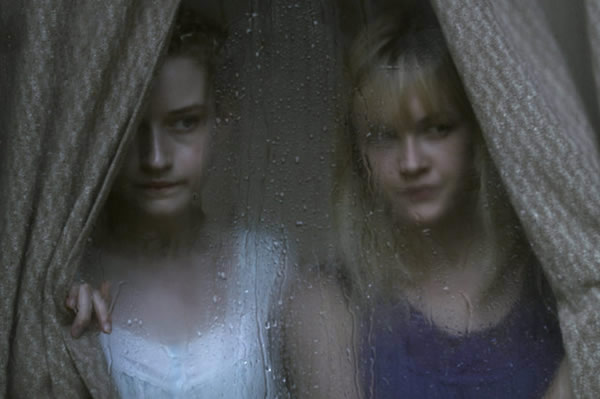Directed by Jim Mickle
Starring Bill Sage, Ambyr Childers, Julia Garner, Jack Gore, Wyatt Russell, Michael Parks, and Nick Damici
Drama, Horror, Thriller
105 Mins
R

In 1826, Anthelme Brillat-Savarin wrote, “Dis-moi ce que tu manges, je te dirai ce que tu es” (Tell me what you eat and I will tell you what you are). Morphing throughout time to arrive at the now common idiom, “We are what we eat,” (a sentiment mostly passed down from overprotective moms encouraging their chubby kids to lay off the potato chips and eat their damn vegetables), has never been more pertinent than in Jim Mickle‘s cannibal-horror We Are What We Are. Forced to consume a set of distressing ideologies (centered around a medieval virgin-consuming ritual) alongside their main course of human meat, the Parker family – a sneaky riff on the uber-sterilized Partridge family – is the centerfold of this gloomy tale of distorted moral recompense and dietary wrongheadedness.
Adapted from the surprise Mexican horror hit of the same name, We Are What We Are asks what a modern day cannibalistic family living on the outskirts of a major society would look like. Surrounded by non-suspecting citizens going about their daily duties, the Parkers live a sheltered farmhouse life; an imprisoning fortress strictly guarded by patriarch Frank (Bill Sage). But Frank’s not your typical “you shall not date” daddy; he takes his role as guardian about three steps further. Not only are his children forbidden from interacting with townsfolk, but they are ingrained with his distorted biblical absolutism, poisonous to all who drink from it.

From Bill Paxon‘s character in Frailty to the intolerable members of the Westborough Baptist Church, there is nothing more terrifying than someone who believes that their definitively antisocial behavior is blessed by a higher power. When that self-righteous attitude is so potent that you can justify consuming your fellow humans, the “blessed” is little more than a common psychopath. What we have here, ladies and gentlemen, is a psychopath.
But the Parker family annual tradition of capturing a young girl, keeping her holed up in a muddy basement dungeon, and eventually harvesting her for a tasty Sunday feast is thrown for a loop when the family matriarch passes out face down in a mud-ridden puddle and drowns. This foreshadow-laden event sets in motion a power shift within the family that threatens to upend their twisted tradition as the bulk of the family responsibilities are left to eldest daughter Iris (Ambyr Childers). Iris now must become the keeper and eventual slaughterer of the caged hostages, ensuring tender human meat is ready to munch down on once their weeks-long fast comes to a close.

Tense and somber, but at times prone to boredom, the most disturbing element of Mickle’s film is grounded within the idea of inherited convictions. A young child is essentially a reflection of their parents and parenting style. You can easily turn a man into a monster, a sweet child into an animal, under the wrong circumstances. Especially if they are sheltered to the point of not knowing any better options and force-fed ideology like a coma patient with a feeding tube. As this Parker family tradition is passed on from generation to generation, we see this barbarous trend that has survived for decades now threatened by the globalization rife in the modern age, as universal information inevitably seeps into the infrastructure of even the most sheltered household.
Iris and younger sibling Rose (Julia Garner) may not have iPhones but they do have a sense of moral right-and-wrong… at least more than their predecessors. Though debates over nature versus nurture stir within the scientific community, there is no denying the fact that the Parker youth have a bit of both factoring into who they have become. Although they’ve been raised under an ideology where the world is damned by God and eating a fellow homo sapien is no different from chowing down on a T-bone steak, there is something ingrained within them telling them otherwise. In the ensuing psychological exploration of his characters, Mickle suggests a Nietzchian theory about “true north” on the moral compass as an act of self-discovery. We cannot ever truly be prescribed an ideology; we must find it in ourselves through knowing ourselves. In this controversial garden, Mickle plays.

Where the film finds itself misstepping is in its despotic gloom. There is no humor to cut the acrid subject material, no sense of over-the-top camp to shower such a grim topic. Just a pounding dim that encompasses all. With such a dour attitude, it’s crosses the line of being too self-serious, denying the audience a necessary break from the domineering bleakness of it all.
Likewise, the cinematography from Ryan Samul leaves something to be desired as there is little inventive about the glum crane shots he uses. His gloomy palette and moody visual undertones are too familiar and become a touch overbearing without anything to interrupt the downtrodden tenor.
As far as the performances, Garner is impressive as little Rose but Sage as Frank is a little too one-noted to make much of an impression. Just as Gardner explores a wide array of Rose’s emotions; fear, rage, grief, terror; Sage offers little to explain the hardened state of Frank’s crumbled psyche, something that would have added paramount interest to this perverted family dynamic. As the leading lady, Childers is an ample moral compass for us to journey through the film with, but her performance is similarly nothing to rave about.
On the final leg though, We Are What We Are delivers on its foreboding sense of terror and unleashes a whopper of a finale. For all the carefully footed build up scattered through the film, the jaw-dropping conclusion is one well-earned payoff that legitimizes a watch, even if it won’t make you eager to eat meat anytime soon.
C+
Follow Silver Screen Riot on Facebook
Follow Silver Screen Riot on Twitter


